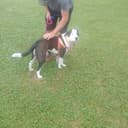Origins and Temperament
Carrying the spirit of ancient civilizations, Chihuahuas hail from Mexico and are believed to be descendants of the Techichi, a companion dog favored by the Toltec society. Known for their brilliant personalities, they're often brimming with confidence and vibrancy. However, due to their small size and alert disposition, Chihuahuas can experience increased anxiety and require special attention when traveling. Their travel needs must be tailored to ensure a sense of security and comfort.
Size and Physical Needs
Chihuahuas are famously diminutive, typically weighing around 2 to 6 pounds, making them the smallest dog breed. This small stature means they need gentle exercise and frequent, but not overly taxing, physical stimulation. During transport, accommodations for their size are crucial, ensuring they're neither overlooked nor placed in situations that could make them feel threatened.
Common Health Considerations
These pint-sized pets can be prone to certain breed-specific health issues such as heart problems and patellar luxation. It's critical to ensure that all health documentation, including vaccination records, is up-to-date pre-travel. Small breed-specific preventative measures, like avoiding cold temperatures or ensuring careful handling to prevent injury, are paramount during transport.
















